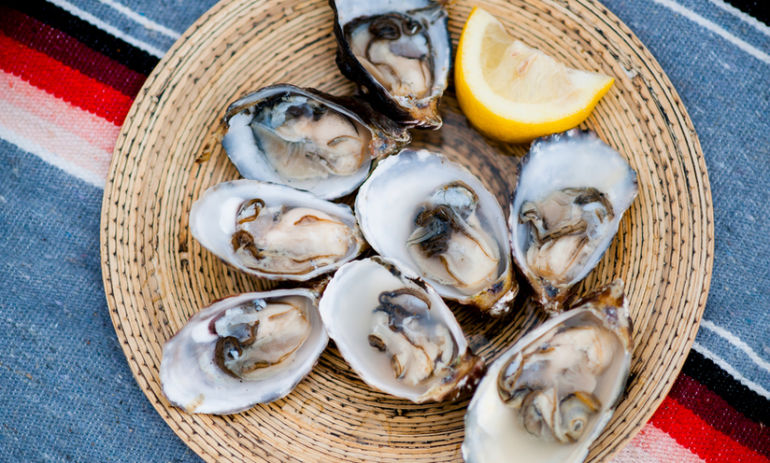
Minerals are tiny compounds involved in hundreds of known functions in your body. They're essential for optimizing your health and performance. So how do you know if you’re getting enough of them?
Zinc, in particular, is a powerful mineral and antioxidant that every cell in your body needs in order to function. (And there are certain instances when you may need more zinc than others!)
Zinc is crucial for immune health, battling oxidation, and for boosting fertility in men and women. Ever heard that oysters are an aphrodisiac? That’s because of their high zinc content! In men, zinc is shown to improve sperm count, sperm motility, and fertilizing capacity.
If that isn’t important enough, we need zinc for optimum growth and development and for taste, smell, and vision. Zinc is used in protein, DNA, and RNA synthesis, wound healing, and is a potent anti-inflammatory. Zinc intake is even protective against compounds like cadmium and mercury, which aren't safe at any level.
Deficiency is uncommon in the developed world, but are you getting enough zinc for optimized health and performance? If you suffer from an autoimmune or GI disease, or chronic head colds or sinus infections, the answer is: probably not.
Pregnancy, lactation, puberty, trauma, surgery, or chronic infections all inhibit the uptake of zinc or use mineral stores quickly. The elderly and those with autoimmunity have a much harder time absorbing zinc, mostly due to depressed stomach acid.
Smoking, excessive alcohol intake, and eating too many refined grains, nuts, and seeds can also have a detrimental effect on mineral stores.
Signs that you may have a zinc deficiency include:
- Hair loss
- Diarrhea
- Sexual dysfunction
- Poor appetite
- Sensitivity to chemicals
- Loss of taste and smell
- Brittle nails
- Delayed wound healing
- Poor immune function
- Unwanted weight loss
- Mental slowness
Ways to maximize your zinc levels (and other minerals)
1. Eat cacao.
Cacao contains high amounts of zinc, along with other crucial minerals like selenium, magnesium, manganese, copper, and iron.
Oysters, pumpkin seeds, organ meats (especially grass-fed/pastured liver), and seaweed are also high in bioavailable minerals. It’s best to get a majority of your nutrients from food, so choose food before you touch the supplements!
2. Ensure adequate stomach acid.
Low stomach acid (hydrochloric acid or HCl) or compromised digestion can inhibit mineral absorption. If you suspect low HCl, add apple cider vinegar or lemon water 10 to 15 minutes before a meal, take a Betaine HCl supplement, or add a digestive enzyme to your routine to increase stomach acid levels and thus mineral absorption.
3. Eat organic, or grow your own.
The result of commercial agriculture is the degradation of our topsoil. This means depletion in the natural mineral content of our food—fruits, vegetables, and animal products.
Buy local, organic when possible, or grow your own vegetables to maximize the nutrients in your food. Grass-fed, pastured animals and their by-products contain more nutrients overall, especially key minerals andessential fatty acids.
4. Ditch refined foods.
The refining process removes much of the fiber, vitamins, and minerals associated with the food. Best to stick to nutrient-dense whole vegetables, meat, and seafood for maximum intake and absorption.
5. Balance zinc with copper.
When it comes to minerals, more is not always better. Zinc must be balanced with copper, for instance, because zinc and copper compete for absorption in the GI tract.
A 15:1 zinc-to-copper ratio is recommended. It is much more common for people to be deficient in zinc than in copper, especially if you are vegan or vegetarian (see #6). However, high levels of zinc impair the absorption of copper as well, so make sure levels are balanced.
You may also want to rethink that calcium supplement, as excess calcium can reduce the absorption of zinc, phosphorus, and manganese.
6. Re-evaluate your diet.
It’s true. Animal-based sources of zinc are more bioavailable than plant-based sources. Strict vegetarian and vegan diets that are high in grains, nuts, and seeds can deplete the minerals found in these foods and leave you mineral deficient.
If you’re not open to eating animals, best to test for adequate mineral levels and supplement where needed.
7. Reduce stress.
Stress comes in many forms—even positive ones like marriage, a new house, or a new baby. Stress in any form causes a demand for more vitamins, minerals, and other nutrients. Meditation or other stress management techniques could have a huge impact on nutrient stores, in addition to improving your quality of life.
8. Reduce/eliminate added sugar consumption.
Sugar intake actually exacerbates deficiencies by enhancing the breakdown and excretion of vitamins and minerals. Reduce sugar intake (especially in the form of fructose) and help your body hold on to crucial nutrients!
9. Soak your nuts and seeds.
Phytic acid is a natural substance found in all plant seeds, nuts, legumes, and grains. When overconsumed, phytates affect the absorption of important minerals like iron, zinc, magnesium, and calcium in the body, slowing or preventing absorption.
Soaking, sprouting, or fermenting these foods can reduce levels of phytic acid for maximum mineral absorption.
10. Check your medications.
Talk with your doctor about certain medications that may be aggravating the excretion of important nutrients.
11. Eat more fat.
Eating mineral-rich foods along with a powerful fat source, like XCT oil or wild salmon, will help your body to absorb vitamins and minerals and also help with brain function, making you feel more energetic, clearheaded, and positive.
For optimum health and performance, and to maximize immunity and fertility, get about 25 mg of zinc per day, taken with your evening meal, or eat plenty of zinc-rich foods every day. This will boost stores of the mineral for when you need it most and help you kick more ass!
by Dave Asprey

No comments:
Post a Comment